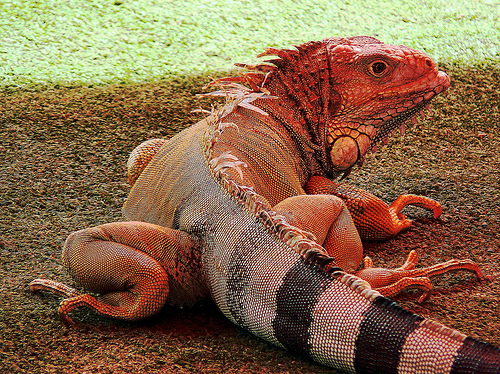The iguana is one of the largest species of lizard families that consists of 60 different types with over 700 species. Iguanas have whiplike tails, curly tails, swifts, and anoles. They are mostly America, specifically southern Canada and South America, and in some on the islands of Madagascar and Fiji.
Iguanas range in type from the terrestrial to the tree dwelling arboreal type and semi-aquatic type. The iguana can easily adapt to their habitat because of its skills like the marine iguana of Galapagos Island that is an excellent swimmer. The green iguana on the other hand likes to be in high trees of rain forest. Others acquire adaptation to live longer in dry or hot deserts.
Iguanas that are forest and desert dwellers are mainly herbivores, eating flower buds, young leaves and fruits while others are insectivore or omnivores that eats juicy mealworm or wax worm.
Common iguanas are quite muscular, the legs and thighs are similar to frogs in appearance. Their toes are delicate; there is a large multi jointed toe on each rear foot that assists iguanas in climbing. They have claws that are extremely sharp. Male iguanas have larger crest on their back compared to female iguanas.
Usually the mouth of iguanas is wide and with very sharp teeth. Their nostril snorts out unwanted salts and possesses external ear drums.
But did you know that most iguanas have a third eye on top of the head? Their third eye actually detects movements from above.

One type of iguana that has this feature is the Red Sided Skink. This type of red iguana dwells on forest habitats and rocky steppes of Southern and Eastern Africa. It reaches for about 8 inches long and like other reptiles they are also egg laying, cold-blooded animals and can easily adapt to its environment.
The Red Skink Iguana eats mealworms and crickets coated with calcium and vitamin power. It is important that they are given clean water, dark leafy green and fruits.
These terrestrial iguanas spend their daily routines looking for foods but just travel for a short distance. Also they are unable to travel to a more suitable habitat and easily become fragmented.
The female red iguanas dig burrow in a hot sunny area where it lays their eggs inside, cover it and then leave the eggs alone. An egg incubates because of the warm temperature that stays a fairly constant of about 77 to 89 degrees Fahrenheit. Usually, all eggs hatches at same time and the young iguanas dig out of the burrow all by themselves.
Iguanas also go through courtship behaviors and they are usually quite timid and flee if approached. But during its courtship, iguana males are quite aggressive.
Unfortunately this kind of species are becoming endangered, the once copious in the wild are now starting to disappear. The main reason is the loss of habitat like deforestation, the existence of animal prey on iguanas and some were eaten by humans like those iguanas that live in islands.
There are several actions and measures that can help iguanas from extinction, such as strict implementation of hunting and collection, captive propagation in places like zoos, and also education programs for people who lives near iguana habitats.
Today, Americans also take part in conserving the iguanas. They adopt them and kept as pets. Hence, these iguanas are given with proper care and good habitat.
